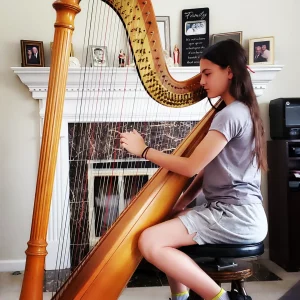After 6.5 years of taking piano lessons, our daughter has decided she would like to switch to harp. We said yes because of several reasons.
Every family is different and every child is different. These are our reasons for accepting her decision and supporting her in her new goal of learning the harp:
- She has always been fascinated with the harp. Even at age six, she used to ask me for harp lessons. Since she had just started violin and added piano six months later, I did not want to interupt that process. I kept telling her piano and violin are our instruments and that’s that. It goes to show how much I know.
- By age eight, she asked about harp lessons enough that I started making inquiries. I talked with a harp teacher in Knoxville and she said yes, you can start harp at age eight. But… not when it is your third instrument. She had other students who took two instruments, but never three. It was hard for me to let go of either piano or violin. We were on a path and I did not want to change. I explained all of this to our daughter and she accepted it.
- She has not had a good rapport with our second piano teacher. This lady is a very talented teacher and there is no problem with her instruction. It’s just that sometimes there is a personality clash between a student and a teacher. Our daughter kept pining for her first piano teacher, whom she loved, but whom we had to replace two years ago. The second piano teacher bothered our daughter in some ways. Our daughter communicated all these little frictions here and there to me but, again, I encouraged her to persevere. We all have to rub along with people we don’t like. I figured this would be a good opportunity for her to learn that. After two years of it though, she had finally had enough.
- If there is no spark between a child and an instrument after two years, Susan Wise Bauer’s mother says the child should quit the instrument altogether. I disagree. Sometimes it takes more than two years, like with our son and violin. It took about four years before he finally said, “Thank you for not letting me quit. Thank you for making me go to orchestra even when I did not want to.” So here is my version of the rule: if there is no spark between a child and an instrument after 6.5 years (as in the case of our daughter and the piano), then let the child switch or quit.
- This summer, it all started when our son decided to quit piano so he could focus on music composition, after eight years of piano lessons. He writes most of his music on the computer, but he still uses the piano a lot for his composing. So he will always have piano in his life, but no lessons or the burden of daily practice. When our daughter saw him get emancipated, she wanted it, too. Since we accepted our son’s decision to quit after eight years of piano, we had to accept her decision to switch instruments.
- The harp is just beautiful. Who doesn’t love the sound of the harp? As a beginner, you don’t squeak. You don’t make horrible sounds. The harp just sounds good from the very beginning. She is already playing Twinkle beautifully. Her teacher says she will probably be ready to present a Christmas piece in church by mid-December.
- We found a wonderful harp teacher, William Lovelace, who checks several boxes: he is a male (better dynamics than a female for older students, I think), was the National President of the American Harp Society 2002-2006, and has had students consistently audition successfully with the youth symphony in Knoxville for the past 16 years and go on to university to study harp on scholarships.
And there you have it, my seven reasons to allow our daughter to switch instruments. There would be many other things to say, but I don’t want to get too technical.
Please follow and like us:

Pingback: Graduating to a Pedal Harp - Homeschool WaysHomeschool Ways
Pingback: Good Lessons, 2022 - Homeschool WaysHomeschool Ways